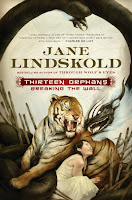 Five Odd Honors is the third book in Jane Lindskold’s series Breaking the Wall, following Thirteen Orphans and Nine Gates. I hesitate to call it the final book since Lindskold has indicated that she would like to write at least one more novel for the series, but she isn’t currently working on another and doesn’t have any immediate plans to write one. While I haven’t enjoyed the series quite as much as I hoped I would, I keep reading the books for a number of reasons. First and foremost is the magic system inspired by the game of mahjong. I haven’t seen this anywhere else and I love it. In addition to Lindskold’s use of mahjong, she has some very interesting world-building based on other Chinese traditions and mythologies. So while parts of the first two books frustrated me immensely, there were enough intriguing concepts and cool ideas introduced that I looked forward to reading Five Odd Honors. Also, as with the previous books, the novel takes its name from a limit hand in mahjong.
Five Odd Honors is the third book in Jane Lindskold’s series Breaking the Wall, following Thirteen Orphans and Nine Gates. I hesitate to call it the final book since Lindskold has indicated that she would like to write at least one more novel for the series, but she isn’t currently working on another and doesn’t have any immediate plans to write one. While I haven’t enjoyed the series quite as much as I hoped I would, I keep reading the books for a number of reasons. First and foremost is the magic system inspired by the game of mahjong. I haven’t seen this anywhere else and I love it. In addition to Lindskold’s use of mahjong, she has some very interesting world-building based on other Chinese traditions and mythologies. So while parts of the first two books frustrated me immensely, there were enough intriguing concepts and cool ideas introduced that I looked forward to reading Five Odd Honors. Also, as with the previous books, the novel takes its name from a limit hand in mahjong.Having successfully established the Nine Gates, allowing access to the Lands Born of Smoke and Sacrifice through a shared underworld, the Thirteen Orphans are one step closer to healing the rift between their world and the Lands. Their task is still not an easy one, and they can’t do it alone. But even with the aid of potential new allies, who have their own motives for helping, the situation is becoming increasingly more dangerous. Something strange is going on in the Lands and the Orphans aren’t even certain who or what they are fighting against anymore. What is certain is that the enemy won’t hesitate to initiates attacks across worlds. If the Orphans want to put a stop to it, they’re going to need to figure out what is happening and act quickly.
I am still somewhat surprised that after three books I haven’t become more attached to the characters in Breaking the Wall. Although I will admit to becoming rather fond of Loyal Wind in Five Odd Honors, overall I have found it difficult to connect with them as individuals. In concept I think they’re very interesting people, but for some reason the chemistry simply isn’t there. The metaphysics used in the story tend not to be as thoroughly explained in Five Odd Honors as they were earlier in the series. This means the plot moves along more quickly, but I sometimes felt I was missing out. The focus also tends to shift somewhat from the Chinese traditions to incorporate more Celtic traditions. Some of the plot developments seemed to be more convenient than convincing, such as the circumstances surrounding parts of the Tigers’ initial fight or characters suddenly revealing hidden skill sets when they happen to be needed. Still, even when the elements weren’t always executed very well, it was fascinating.
It would be extremely difficult to read Five Odd Honors as a stand alone novel. I would recommend reading at least the second book, Nine Gates, before attempting Five Odd Honors. Even I, who have been following the series, took a while to settle into the book. That being said, I actually found Five Odd Honors more enjoyable and easier to read overall than the previous two volumes in the series. The Orphans and their cohorts have a tendency to talk things to death, something that is acknowledged within the actual narrative. Fortunately, this is not nearly as troublesome in Five Odd Honors; while it still happens, the pacing is much improved. I do hope that Lindskold has the opportunity to publish at least one more volume of Breaking the Wall. Although Five Odd Honors has a definite and somewhat satisfying ending, there are quite a few loose ends left, even reaching back as far as Nine Gates if not further. Lindskold still has plenty of roads left to explore in Breaking the Wall and I would like to see where they go.

